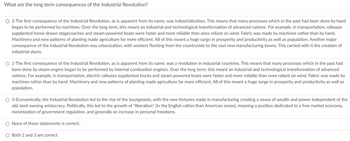Question

Transcribed Image Text:What are the long term consequences of the Industrial Revolution?
O 2-The first consequence of the Industrial Revolution, as is apparent from its name, was industrialization. This means that many processes which in the past had been done by hand
began to be performed by machines. Over the long term, this meant an industrial and technological transformation of advanced nations. For example, in transportation, railways
supplanted horse-drawn stagecoaches and steam-powered boats were faster and more reliable than ones reliant on wind. Fabric was made by machines rather than by hand.
Machinery and new patterns of planting made agriculture far more efficient. All of this meant a huge surge in prosperity and productivity as well as population. Another major
consequence of the Industrial Revolution was urbanization, with workers flocking from the countryside to the vast new manufacturing towns. This carried with it the creation of
industrial slums.
1-The first consequence of the Industrial Revolution, as is apparent from its name, was a revolution in industrial countries. This means that many processes which in the past had
been done by steam engine began to be performed by internal combustion engines. Over the long term, this meant an industrial and technological transformation of advanced
nations. For example, in transportation, electric railways supplanted trucks and steam-powered boats were faster and more reliable than ones reliant on wind. Fabric was made by
machines rather than by hand. Machinery and new patterns of planting made agriculture far more efficient. All of this meant a huge surge in prosperity and productivity as well as
population.
O 3-Economically, the Industrial Revolution led to the rise of the bourgeoisie, with the new fortunes made in manufacturing creating a nexus of wealth and power independent of the
old, land-owning aristocracy. Politically, this led to the growth of "liberalism" (in the English rather than American sense), meaning a position dedicated to a free market economy,
minimization of government regulation, and generally an increase in personal freedoms.
O None of these statements is correct.
Both 2 and 3 are correct
Expert Solution
This question has been solved!
Explore an expertly crafted, step-by-step solution for a thorough understanding of key concepts.
Step by stepSolved in 4 steps
